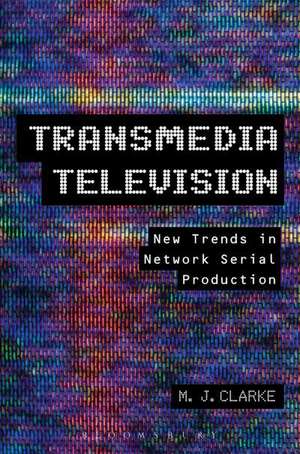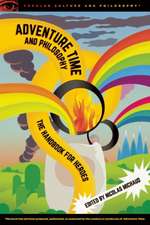Transmedia Television: New Trends in Network Serial Production
Autor M. J. Clarkeen Limba Engleză Paperback – 13 feb 2013
| Toate formatele și edițiile | Preț | Express |
|---|---|---|
| Paperback (1) | 238.67 lei 6-8 săpt. | |
| Bloomsbury Publishing – 13 feb 2013 | 238.67 lei 6-8 săpt. | |
| Hardback (1) | 598.47 lei 6-8 săpt. | |
| Bloomsbury Publishing – 13 feb 2013 | 598.47 lei 6-8 săpt. |
Preț: 238.67 lei
Preț vechi: 273.88 lei
-13% Nou
Puncte Express: 358
Preț estimativ în valută:
45.67€ • 47.74$ • 38.60£
45.67€ • 47.74$ • 38.60£
Carte tipărită la comandă
Livrare economică 07-21 martie
Preluare comenzi: 021 569.72.76
Specificații
ISBN-13: 9781441165527
ISBN-10: 1441165525
Pagini: 224
Ilustrații: 3 illus
Dimensiuni: 150 x 226 x 20 mm
Greutate: 0.41 kg
Ediția:New.
Editura: Bloomsbury Publishing
Colecția Bloomsbury Academic
Locul publicării:New York, United States
ISBN-10: 1441165525
Pagini: 224
Ilustrații: 3 illus
Dimensiuni: 150 x 226 x 20 mm
Greutate: 0.41 kg
Ediția:New.
Editura: Bloomsbury Publishing
Colecția Bloomsbury Academic
Locul publicării:New York, United States
Caracteristici
Examines the production of derived comicbooks, novels, video-games and made-for-cellular-phone entertainment.
Notă biografică
M.J. Clarke earned his PhD in Film and Television from UCLA in 2010. His work has previously been published in Television and New Media and Communication, Culture & Critique.
Cuprins
Introduction Chapter One: Network Television: The Comicbook Chapter Two: Network Television: The Novel Chapter Three: Network Television: The VideoGame Chapter Four: Network Television: The Mobisode Chapter Five: Lost and Mastermind Narration Chapter Six: 24 and Tentpole Spatiality Chapter Seven: Alias and Reflective Uncertainty Conclusion
Recenzii
Transmedia Television: New Trends in Network Serial Production offers a fascinating insight in the industrial conditions that have shaped the emergence of transmedia television content in the U.S. Clarke integrates production analysis with insightful analysis of key programme case studies and demonstrates the importance of exploring how the industry is making television far more than just TV.
Through a series of compelling case studies, Clarke examines the use of the tentpole strategy as both a form of industrial practice and as a creative necessity in today's broadcast television environment. By investigating this important development in the production, marketing, and reception of recent television programs, Transmedia Television makes a vital contribution to the field of television studies.
With detailed attention to how media workers navigate changes in the television industry, Clarke accounts not just for shifting markets and organizational structures, but also social bonds, rituals, and meaningful cultural forms. Engaged in careful, media-specific, stylistic analysis of television streamed across new platforms and creative frontiers, his book offers a thoughtful and unique approach to understanding media production cultures.
In Transmedia Television, Clarke offers a rigorous analysis of the cultural industries of 'tentpole TV,' presenting a compelling examination of how the television industry adapts to a new media ecology.
Through a series of compelling case studies, Clarke examines the use of the tentpole strategy as both a form of industrial practice and as a creative necessity in today's broadcast television environment. By investigating this important development in the production, marketing, and reception of recent television programs, Transmedia Television makes a vital contribution to the field of television studies.
With detailed attention to how media workers navigate changes in the television industry, Clarke accounts not just for shifting markets and organizational structures, but also social bonds, rituals, and meaningful cultural forms. Engaged in careful, media-specific, stylistic analysis of television streamed across new platforms and creative frontiers, his book offers a thoughtful and unique approach to understanding media production cultures.
In Transmedia Television, Clarke offers a rigorous analysis of the cultural industries of 'tentpole TV,' presenting a compelling examination of how the television industry adapts to a new media ecology.






